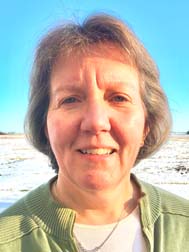Womaen’s Caucus interviewed candidates for the 2020 deferred and 2021 ballots which will be voted on by Annual Conference delegates in July. We asked the same questions for each position, plus one unique question based on something we read in the candidate’s profile. See all the candidates we interviewed here.

mission & ministry board
kathy mack
You are a candidate for membership in a critical leadership group within the Church of the Brethren. What do you believe are the most significant leadership needs within the denomination over the next five years?
Love and trust in the Lord
Love of the Church of the Brethren and its people
Commitment to the church and its future as well as its heritage
Vision for the future
Listening and communication skills
Integrity
To be a living example of leading a Christian life focused on peace and reconciliation
To be a servant leader to both the Church of the Brethren and the nation and world in which we live
How do the statements and actions from MMB respond to those needs?
The Mission and Ministry Board is tasked with providing opportunities for local congregations to be communities of faith that proclaim the good news of Jesus Christ, respond to the needs of neighbors and to promote peace. All statements and actions of MMB need to keep these values at the forefront when responding to specific needs of our church body and when calling leaders forward.
What resources do you bring to this work?
I worked over 30 years for an international technology company. During my career I worked with many different types of people from around the world. I was required to assess and solve complicated problems, while communicating with peers, executives, and customers.
I also have had numerous leadership positions within the Church of the Brethren and non-denominational Christian groups. Each of these experiences have allowed me to work with people very committed to their relationship with Christ but bringing different views and approaches to living their faith.
My years of experience from my career and my church work have given me good listening, discerning and communication skills that I believe and I can understand, but not necessarily agree with, most people’s point of view, which allows me to search for and often find common ground.
What additional resources do you need and/or what additional resources does MMB need to serve the denomination?
To be successful, MMB needs the trust and support of the denomination, its individual congregations and most importantly listening for and following God’s will.
Tell us about a context in which you were or a current context in which you are a minority. And we’re hoping for something that’s longer than a week long workcamp.
My entire adult life, I have studied and then worked in the computer technology field. This career path is dominated by men. Since my freshman year of college at McPherson College, as a woman, I have been in the minority. I have also worked my entire career with international peers and customers which has given me the perspective of a global community, working for common goals. In my most recent team, I was the only US citizen, with my teammates being from China and Romania.
You have early church (which today is innovative church) experiences, such as house church and Sending of the Seventy. What vision or insight can you bring from innovative church to MMB and our denomination?
Being a member of a house church brings many advantages and some challenges. As a small group, every member is valued and needed for success. Without the expenses of a building or employees, we are able to put 100% of our funds towards outreach and witnessing to our local, regional, national and global communities. The challenge of not having a building, it is harder to have a focal point for our meetings, inviting guests and a visible presence in our community.
The Sending of the Seventy was an activity that was used several times in the Northern Plains District to address some deep concerns and divisions among congregations. We sent 2 visitors to each church to listen to the issues, hopes and joys of each congregation and then to report back at the district level what was learned. One of several take-aways I learned was at the root of many problems is the feeling of individuals and congregations that they are not being heard and their concerns are not taken seriously. By sending visitors from other congregations, some traveling many hours for the meetings, a sense of caring and commitment was conveyed.

mission & ministry board
daniel butler
You are a candidate for membership in a critical leadership group within the Church of the Brethren. What do you believe are the most significant leadership needs within the denomination over the next five years?
It’s not hard to look and look around and see that we have a lot of division everywhere. It seems to be fairly easy to come up with something to divide us on. So I guess I’d say one of the things I see coming up with the next five years is finding a working strategy to help bring us together. And one of those could definitely be through the visioning process that we’re going through right now, that will go on with Annual Conference. It’s very easy to split, this group over here, this group over there. To sift through that and find the commonality between the two, and build on that. As we move forward, we have to be Christ-centered in all things that we do, and being mindful of that would be a good starting point.
How do the statements and actions from MMB respond to those needs?
I think we’re moving in the right direction, like I said, with the shared vision process that we’re going through. Having a leadership group that is flexible enough to meet these ever-changing waves and currents. But at the same time, still being able to focus and work toward the greater good.
What resources do you bring to this work?
I have spent the last year eight years on our the Northern Plains District Board with one of those years being moderator-elect, another year being moderator. I’m a McPherson college graduate, Bachelor in history. I’ve been in sales the last 20 some years. On the side, volunteer coaching, just wrapped up a softball season and we had a lot of fun. Wrapping up my last term as board chair. I wouldn’t necessarily say that that qualifies me for anything but I’m not afraid to get on board. I’ve been told I play well with others. I definitely think that’s a positive coming in to a new group, especially one as diverse as we hope this one is.
What additional resources do you need and/or what additional resources does MMB need to serve the denomination?
I don’t know if Northern Plains is any sort of microcosm. One of the things that I joked around with for a long time was that I was the youngest member on District Board, and basically spent all of my 30s on district boards. And so that was kind of a running joke for me year after year. Oh, hey, look, I’m still the youngest. We should not only have gender and racial diversity, but age. Each age group has interesting personalities, different life experiences, all add so that no group is ever the same. And that is absolutely wonderful. Because we absolutely should be the same group every time. Growth is so much better than stagnation. So just making sure that we’re able to draw from all groups, all experience to be able to gather experiences like that.
Tell us about a context in which you were or a current context in which you are a minority. And we’re hoping for something that’s longer than a week long workcamp.
Thinking about this question is really interesting. Look at where I check the boxes on my IRS taxes. I’m approaching middle age, white, I’m a male and I’m overweight. I’m average.
I had a multicultural studies class at McPherson taught by Professor Jessica Brown, an absolutely wonderful woman. The coolest thing about the class was I was one of only about 5 white people in the class. And I know that for myself, and a friend of mine that also took it, it was very eye-opening. Hearing firsthand experiences of racial profiling was…eye-opening isn’t the right word, because it’s not powerful enough to say what it was for me. I mean, one of the stories told by one of my classmates, an absolutely wonderful human being–he was about six foot one, Hispanic, had tattoos, and was wearing a gray sweatshirt. He was actually arrested two or three times in one day, just because he fit a profile. He told us about it — he gave us as much detail as he felt comfortable giving. You couldn’t help but sit there in awe that he kept his wits about him. He had done nothing wrong. It was stories like that. There were a few other students that were able to speak up about their experiences. It was very humbling. It really, at that time, brought some context to someone raised in a very monochromatic situation. Not that there wasn’t any other exposure to other cultures growing up, but once-in-awhile, not everyday life.
That has thankfully changed over time. I have a niece that is biracial and she’s an absolute blessing. It’s been really interesting to see her come through this period and see her reactions to a lot of different events that are going on right now. And at the same time, it’s very odd. Because I know there are questions she has that none of us can answer. Because I’m like, a middle-age white male. I don’t know. So while I don’t understand, I have empathy.
From coaching to district board. What are some blessings and some burdens of working in a team?
I’ll be honest. There are times getting a new group of young people is much scarier than joining district board. It’s a different situation: coach/player relationship versus the peer-to-peer level playing field where I’m not in charge. What is absolutely wonderful about being a part of a group (like district board) is you’re part of a group of people that are called, and have passion to be a part of something beyond themselves. We definitely did not see eye-to-eye on everything which was wonderful.
There can be no growth without something to work towards. So getting to know the different board members, learning to work with different personalities. That’s one of the greatest things about working with groups. Even coaching: all the little micro personalities, no matter what, the goal is always the same. I want my players to learn skills. I want them to be able to see that the skills translate into other things but most importantly I want to make sure that they have fun.
I often say that if I’m somewhere and then I tell you I’m not having a good time there’s a pretty good chance that leaving. So if I’m somewhere, I’m having a good time! Otherwise why would I stay? So I want to make sure that they have a good time.